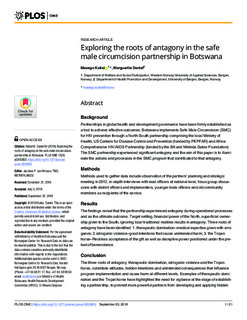| dc.contributor.author | Katisi, Masego | |
| dc.contributor.author | Daniel, Marguerite | |
| dc.coverage.spatial | Botswana | nb_NO |
| dc.date.accessioned | 2019-01-16T08:25:37Z | |
| dc.date.available | 2019-01-16T08:25:37Z | |
| dc.date.created | 2018-10-22T12:29:37Z | |
| dc.date.issued | 2018 | |
| dc.identifier.citation | Katisi, M., & Daniel M. (2018). Exploring the roots of antagony in the safe male circumcision partnership in Botswana. PLoS ONE, 13(9). | nb_NO |
| dc.identifier.issn | 1932-6203 | |
| dc.identifier.uri | http://hdl.handle.net/11250/2580789 | |
| dc.description.abstract | Background
Partnerships in global health and development governance have been firmly established as a tool to achieve effective outcomes. Botswana implements Safe Male Circumcision (SMC) for HIV prevention through a North-South partnership comprising the local Ministry of Health, US Centers for Disease Control and Prevention (funded by PEPFAR) and Africa Comprehensive HIV/AIDS Partnership (funded by the Bill and Melinda Gates Foundation). The SMC partnership experienced significant antagony and the aim of this paper is to illuminate the actions and processes in the SMC program that contributed to that antagony.
Methods
Methods used to gather data include observation of the partners’ planning and strategic meeting in 2012, in-depth interviews with lead officers at national level, focus group discussions with district officers and implementers, younger male officers and old community members as recipients of the service.
Results
The findings reveal that the partnership experienced antagony during operational processes and as the ultimate outcome. Target setting, financial power of the North, superficial ownership given to the South, ignoring local traditional realities results in antagony. Three roots of antagony have been identified: 1. therapeutic domination–medical expertise given with arrogance; 2.iatrogenic violence–good intentions that cause unintended harm; 3. the Trojan horse–Reckless acceptance of the gift as well as deceptive power positioned under the pretext of benevolence.
Conclusion
The three roots of antagony; therapeutic domination, iatrogenic violence and the Trojan horse, constitute attitudes, hidden intentions and unintended consequences that influence program implementation and cause harm at different levels. Examples of therapeutic domination and the Trojan horse have highlighted the need for vigilance at the stage of establishing a partnership, to prevent more powerful partners from developing and applying hidden agendas and to strengthen accountability from the local partner. Iatrogenic violence has highlighted the need for partnership interventions to prevent good partner intentions accidentally producing bad outcomes. | nb_NO |
| dc.language.iso | eng | nb_NO |
| dc.publisher | PLoS | nb_NO |
| dc.rights | Navngivelse 4.0 Internasjonal | * |
| dc.rights.uri | http://creativecommons.org/licenses/by/4.0/deed.no | * |
| dc.title | Exploring the roots of antagony in the safe male circumcision partnership in Botswana | nb_NO |
| dc.type | Journal article | nb_NO |
| dc.type | Peer reviewed | nb_NO |
| dc.description.version | publishedVersion | nb_NO |
| dc.rights.holder | © 2018 Katisi, Daniel. | nb_NO |
| dc.source.pagenumber | 1-21 | nb_NO |
| dc.source.volume | 13 | nb_NO |
| dc.source.journal | PLoS ONE | nb_NO |
| dc.source.issue | 9 | nb_NO |
| dc.identifier.doi | 10.1371/journal.pone.0200803 | |
| dc.identifier.cristin | 1622228 | |
| cristin.unitcode | 203,3,60,0 | |
| cristin.unitname | Institutt for sosialfag og vernepleie - Bergen | |
| cristin.ispublished | true | |
| cristin.fulltext | original | |
| cristin.qualitycode | 1 | |

